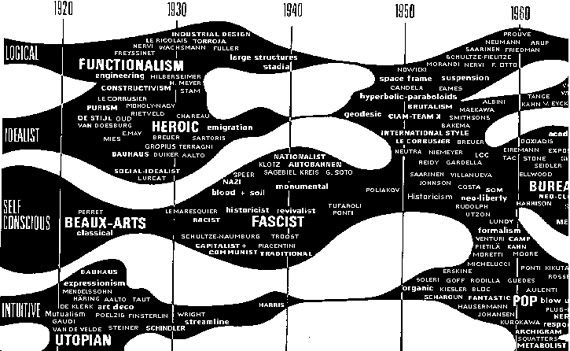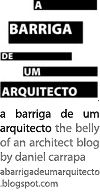«Dead words» by Lebbeus Woods
Published Thursday, September 25, 2008.
Image from “Modern Movements in Architecture” by Charles Jencks (1973, Penguin).
Lebbeus Woods has recently published an interesting theoretical exercise about ”dead words”: words and terms that have lost their significance in the architectural world.
His small essay is particularly revealing of unconcealed mutations that have taken place in architecture history. Many of his fading words are, in one way or another, related to twentieth century modern culture and theory. Their loss of meaning is enlightening as to a wider process of deconstruction of political ideologies that sustained modern theory. A process under which we may identify the true implications of post-modernism: the rise of the marketplace, the prevalence of the economic discourse over political ideas and beliefs. Words like RADICAL and PROGRESS refer directly to such concepts that have lost meaning in the transition to post-modernity, latu sensu. The abandonment of other words – NEW, ORIGINAL, EXPERIMENTAL – exposes a reality tainted by the fall of idealism. Cynicism has prevailed. The elites have fallen – GENIUS – and are now looked upon, as LW says, with derogatory terms: “celebrity”, “starchitect”.
Maybe one could extrapolate as to a wider dimension of this vast process, as an evidence of the death of certain ideas. And so I would add two words to the list: STYLE and MOVEMENT. The idea of STYLE as a specific discourse enclosed great meaning in architecture theory, as an expression of certain artistic and ideological principles. This concept has lost its meaning altogether in contemporary architectural practice. Architects no longer assume themselves as the bearers of such doctrines. The idea of the architect as an advocate for STYLE seems ludicrous in a world dominated by shattered complexity. Pattern recognition has replaced the linear thinking of the modern world, and architecture practice now focuses on process and programmatic analysis, giving birth to new concepts: creative diagramming, for example.
Also, the idea of MOVEMENT as an ideologically charged expression has become distant. The accelerated information landscape of the digital world has changed our perspective of history as a linear sequence of cultural movements. Complexity and uncertainty are the dominant values of our times. And so, as the world changes into the unknown, so change our architectural manifestations, and so does our language.
ENGLISH EDITION
The English-only edition of the blog A Barriga de um Arquitecto is no longer being updated. Please visit the main page to access new content, additional information and links.
ARCHIVES | ARQUIVO
September 2008 October 2008 November 2008 December 2008 January 2009 February 2009 March 2009 April 2009 May 2009 June 2009 July 2009 August 2009 September 2009 October 2009 November 2009 December 2009 January 2010 February 2010 March 2010 April 2010 May 2010 June 2010 July 2010 August 2010 November 2010 January 2011 February 2011 March 2011 June 2011 July 2011 October 2011 December 2011

0 Messages to “«Dead words» by Lebbeus Woods”
» Leave a message